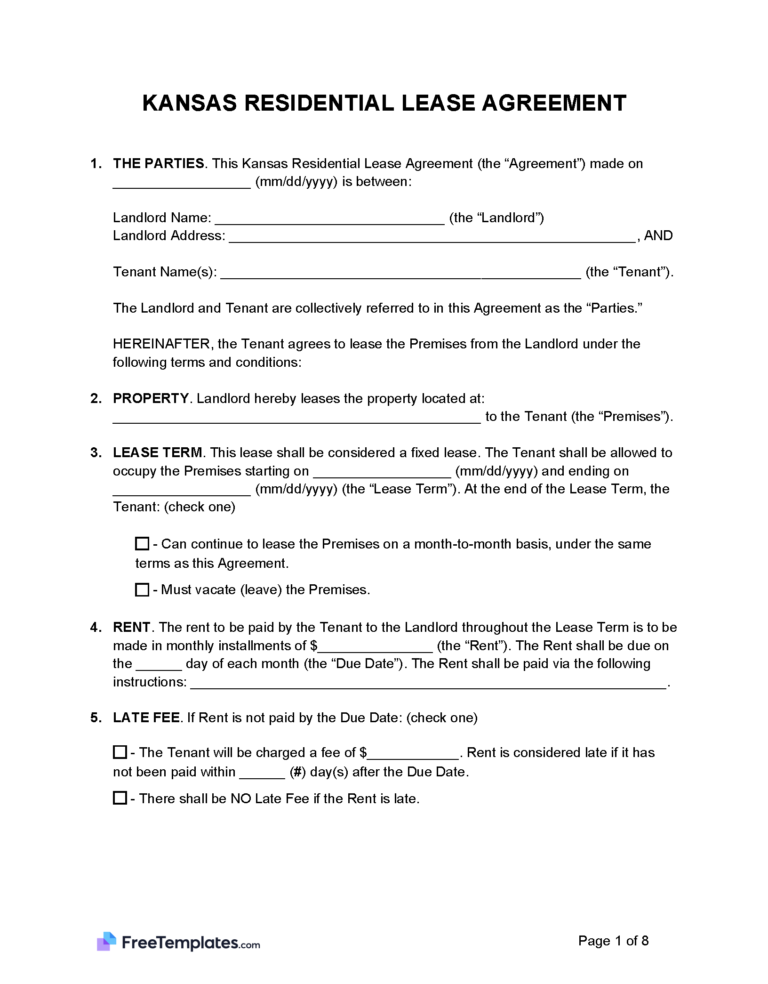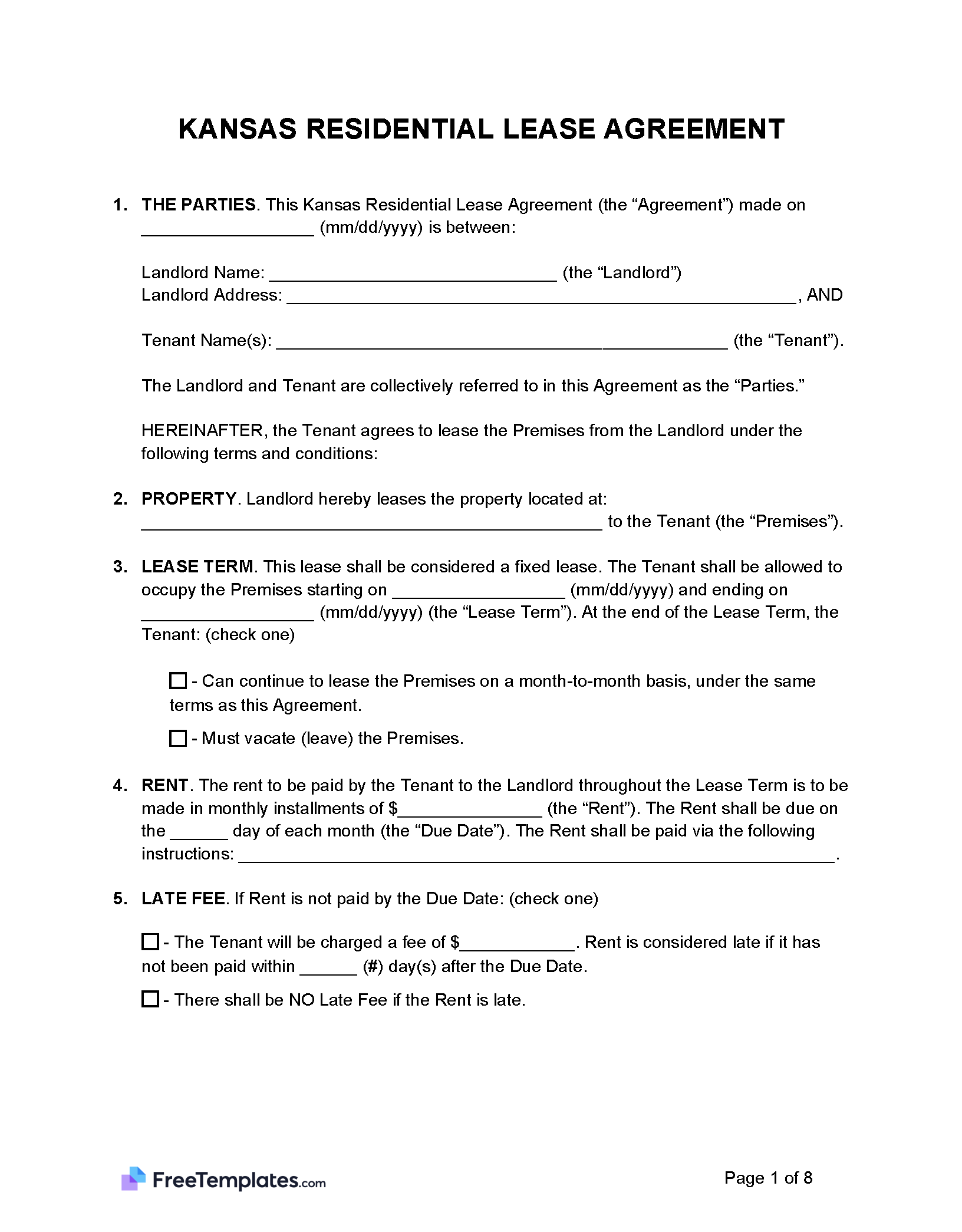By Type (6)
| Standard Lease Agreement – A traditional rental arrangement for a residence that is legally binding for a fixed tenancy term, typically 12-month periods. |
| Commercial Lease Agreement – A rental contract to rent a property for industrial, office, retail or business purposes. |
| Month-to-Month Lease Agreement – An at-will tenancy for a rental property that is valid for 30-day periods. |
| Rent-to-Own Agreement – A unique contract in which the landlord agrees to sell the rental property to the tenant after a disclosed period of time. |
| Roommate Agreement – A written understanding between people who live together to outline the rules and responsibilities for cohabitation. |
| Sublease Agreement – In Kansas, tenants must obtain written permission from the landlord before renting out the unit to a new tenant. Otherwise, the original tenant may be in violation of the lease. |
Disclosures (3)
Authorized Persons Contact Details – The landlord must disclose a list of names and addresses for any authorized person to enter the rental unit and for the person responsible for collecting notices and demands. The landlord is responsible for keeping this information current throughout the lease term. (§58-2551)
Lead-Based Paint Disclosure – If the rental property is built before January 1, 1978, the landlord must inform the future tenant if lead-based paint is on the premises.
Inventory and Condition of the Property – The landlord and tenant must walk through the rental unit together and list any pre-existing blemishes or items needing repair. This must be done within the first 5 days of occupancy. (§58-2550(a))
Security Deposit
Maximum Amount – The amount a landlord can charge in Kansas for security deposits depends on whether the rental property is unfurnished or furnished, and if there are pets allowed in the dwelling.
- For unfurnished units, a tenant may be charged up to 1 month’s rent;
- For furnished properties, the renter can be charged up to 1.5 months.
- For units with approved pets, the landlord can charge up to a half month’s rent. (§58-2550(a))
Returning to Tenant – At the end of the lease’s term, the landlord can apply the security deposit to any unpaid rent or damages outside of normal wear and tear caused by the tenant. Any remaining funds must be returned to the tenant within 14 days of determining the amount due and no more than 30 days after the tenant moves out. (§58-2550(b))
- Itemized List Required? The landlord must provide a written itemized list of the deductions for damages. Failure to do so could result in the tenant recovering the wrongfully withheld portion of the deposit plus damages equal to 1.5 times the amount withheld. (§58-2550(c))
- Can Their Security Deposit be Used For Last Month’s Rent? The tenant is not allowed to use their security deposit as the last month’s rent or any time when paying rent. If they do so, the security deposit is forfeited, and the landlord can demand rent due as if the deposit had not been applied or deducted. (§58-2550(d))
Landlord Access
General Access – The landlord can enter the rental premises after giving reasonable notice and at reasonable hours. (§58-2557(a))
- Reasons for Entry – A landlord may need to enter the unit by making necessary or agreed-upon repairs or services, decorations, alterations, or improvements or showing the property to potential buyers, tenants, workmen, or contractors. (§58-2557(a))
Emergency Access – The landlord can enter at any time if there is an extreme hazard, including the potential loss of life or severe property damage. (§58-2557(b))
Paying Rent
Grace Period – Kansas has no state-mandated Grace Period for rent payments. However, the lease agreement may disclose a forgiveness period for delayed rent.
Maximum Late Fee – Kansas has no set limit.
Returned Checks (NSF) – Landlords can charge $30 for bounced checks. (§16a-2-501(eiii))
Reasons for Eviction (2)
Non-Payment of Rent – A day after the rent is delayed, the landlord can issue a 3-Day Notice to Pay or Quit. This gives the renter a maximum of 3 days to pay the rent in full or terminate the lease. (§58-2564(b))
Non-Compliance – The landlord can serve a 14/30-Day Notice to Comply for lease violations. This can include illegal activity, property damage, safety and health violations, having an unauthorized pet, or having too many people living in the rental unit. With this notice, the tenant has 14 days to resolve the issue or move out within 30 days of the written notification. (§58-2564(a))

